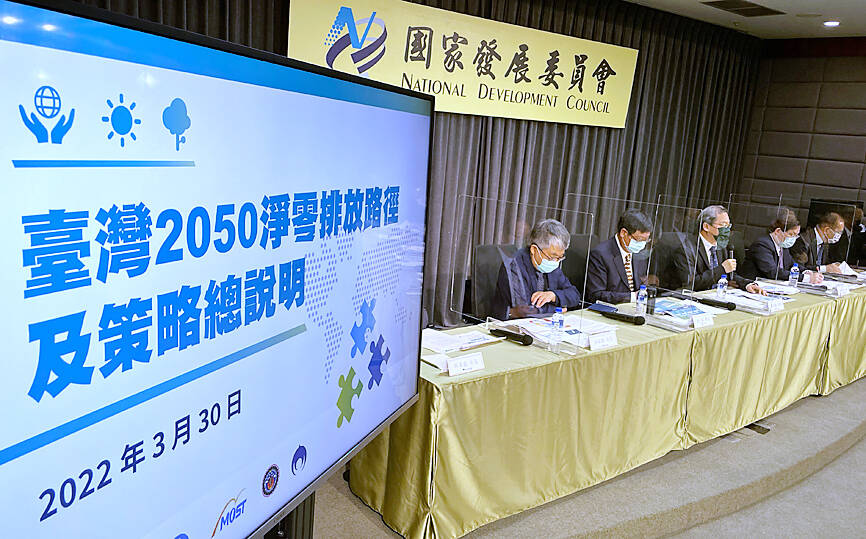A carbon exchange that is set to open in the middle of next year would help the government meet its net zero emissions goal by 2050, the National Development Council (NDC) said on Saturday.
In a statement released to mark Earth Day, the council said the exchange would help integrate resources and capital to push for emissions reduction through carbon credit trading.
The council said setting up the exchange is part of efforts to reach the 250 net zero emissions goal, which was enshrined into law by the Climate Change Response Act (氣候變遷因應法) in February.

Photo: Liu Hsin-de, Taipei Times
The act also stipulates a carbon border adjustment mechanism, which enables the government to levy fees on imports of carbon-intensive products.
As a result, Taiwan would from 2050 be bound to ensure that greenhouse gas emissions do not exceed the amount of greenhouse gases removed from the atmosphere, the NDC said.
The act also forms the legal basis for the government’s plan to collect carbon fees and introduce a carbon pricing scheme, and provides incentives to cut emissions, the council said.
Companies that are unable to reduce emissions due to high costs could purchase credits on the carbon exchange to offset their emissions, analysts said.
On Thursday, the Taiwan Stock Exchange (TWSE) announced that it is working with the National Development Fund to set up a carbon exchange.
Registration for the new platform would open in the middle of next year, it said.
The digital carbon exchange is expected to offer standardized contracts to buyers and sellers of emissions credits.
The TWSE said that it set up a task force to prepare the platform last year.
The task force has visited Japan, South Korea and Singapore to learn about carbon credit systems, it said.
After the Climate Change Response Act was passed in January, the TWSE started working with the Financial Supervisory Commission, the Environmental Protection Administration and the Ministry of Economic Affairs to expedite the establishment of the carbon exchange, it said.
The TWSE said it is planning to consult with business groups and environmental protection groups on the matter.
The carbon exchange would offer domestic and international carbon credit transactions and other services, including educational programs, the TWSE said.
The carbon exchange would help companies reach their individual carbon reduction targets and reduce their costs to reduce emissions, it said.
The platform is expected to entice Taiwanese and international companies to cooperate on emissions reduction, and help Taiwan boost its efforts to develop its economy while taking environmental protection and social sustainability into account, it said.
The NDC said that the local bourse and the National Development Fund would initially inject funds into the carbon exchange to ensure that the platform would serve as a comprehensive carbon credit exchange mechanism for Taiwan in accordance with the nation’s environmental protection rules.

TAKING STOCK: A Taiwanese cookware firm in Vietnam urged customers to assess inventory or place orders early so shipments can reach the US while tariffs are paused Taiwanese businesses in Vietnam are exploring alternatives after the White House imposed a 46 percent import duty on Vietnamese goods, following US President Donald Trump’s announcement of “reciprocal” tariffs on the US’ trading partners. Lo Shih-liang (羅世良), chairman of Brico Industry Co (裕茂工業), a Taiwanese company that manufactures cast iron cookware and stove components in Vietnam, said that more than 40 percent of his business was tied to the US market, describing the constant US policy shifts as an emotional roller coaster. “I work during the day and stay up all night watching the news. I’ve been following US news until 3am

Six years ago, LVMH’s billionaire CEO Bernard Arnault and US President Donald Trump cut the blue ribbon on a factory in rural Texas that would make designer handbags for Louis Vuitton, one of the world’s best-known luxury brands. However, since the high-profile opening, the factory has faced a host of problems limiting production, 11 former Louis Vuitton employees said. The site has consistently ranked among the worst-performing for Louis Vuitton globally, “significantly” underperforming other facilities, said three former Louis Vuitton workers and a senior industry source, who cited internal rankings shared with staff. The plant’s problems — which have not

TARIFF CONCERNS: The chipmaker cited global uncertainty from US tariffs and a weakening economic outlook, but said its Singapore expansion remains on track Vanguard International Semiconductor Corp (世界先進), a foundry service provider specializing in producing power management and display driver chips, yesterday withdrew its full-year revenue projection of moderate growth for this year, as escalating US tariff tensions raised uncertainty and concern about a potential economic recession. The Hsinchu-based chipmaker in February said revenues this year would grow mildly from last year based on improving supply chain inventory levels and market demand. At the time, it also anticipated gradual quarter revenue growth. However, the US’ sweeping tariff policy has upended the industry’s supply chains and weakened economic prospects for the world economy, it said. “Now

COLLABORATION: Given Taiwan’s key position in global supply chains, the US firm is discussing strategies with local partners and clients to deal with global uncertainties Advanced Micro Devices Inc (AMD) yesterday said it is meeting with local ecosystem partners, including Taiwan Semiconductor Manufacturing Co (TSMC, 台積電), to discuss strategies, including long-term manufacturing, to navigate uncertainties such as US tariffs, as Taiwan occupies an important position in global supply chains. AMD chief executive officer Lisa Su (蘇姿丰) told reporters that Taiwan is an important part of the chip designer’s ecosystem and she is discussing with partners and customers in Taiwan to forge strong collaborations on different areas during this critical period. AMD has just become the first artificial-intelligence (AI) server chip customer of TSMC to utilize its advanced